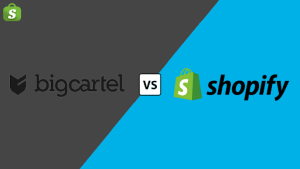
Comparing Big Cartel and Shopify: A Comprehensive Guide
Exploring Big Cartel's Features and Functionality
Big Cartel is an e-commerce platform that caters primarily to artists, makers, and small businesses. It offers a range of features designed to help creators showcase and sell their products online. One of the standout features of Big Cartel is its simplicity and ease of use. The platform is user-friendly, making it ideal for those who don't have extensive technical knowledge or experience in web design. With Big Cartel, you have the ability to create and customize your online store easily. The platform offers a selection of themes and templates that can be customized to reflect your brand's aesthetic. Additionally, Big Cartel provides various tools to manage your inventory, track sales, and communicate with customers. However, compared to Shopify, Big Cartel may lack some advanced features that larger businesses may need. It has limited scalability and may not offer the same level of flexibility when it comes to integrations with third-party apps and services.Key Features of Shopify for E-commerce
- User-Friendly Interface: Shopify's dashboard and admin interface are intuitive, making it accessible for users of all technical levels.
- Extensive Theme Selection: Choose from a range of professionally designed themes that can be easily customized to reflect your brand identity.
- Scalability: Shopify can seamlessly handle increasing traffic and accommodate growing product inventories without compromising on performance.
- App Store: Access a vast array of apps and integrations to enhance the functionality of your store, from marketing tools to inventory management solutions.
- Mobile Responsiveness: All Shopify themes are optimized for mobile devices, ensuring a seamless shopping experience across different screen sizes.
- Payment Gateway Integration: Easily accept payments through multiple channels, including credit cards, PayPal, and more.
- SEO Tools: Built-in SEO features help optimize your store for search engines, improving your visibility and attracting more organic traffic.
- Analytics and Reporting: Gain insights into your store's performance with detailed analytics and reporting tools, allowing you to make informed business decisions.
- Inventory Management: Efficiently manage your product inventory, including tracking stock levels and generating automatic alerts for low stock.
- Security and Reliability: Shopify handles security updates and maintenance, providing a secure and reliable platform for your online store.
- Customer Support: Benefit from Shopify's customer support team, available 24/7 to assist with any technical issues or questions.
- Marketing and Promotions: Run targeted marketing campaigns, discounts, and promotions using built-in tools to drive sales and customer engagement.
- Customization: While initially challenging for beginners, Shopify's customization options offer unparalleled flexibility to tailor your store to your unique requirements.
- Community and Resources: Join a vibrant community of Shopify users and developers, with access to forums, tutorials, and guides to help you maximize your store's potential.
- Integration with Third-Party Services: Easily integrate with other platforms such as social media, email marketing, and fulfillment services for a seamless business operation.
Breaking Down the Pros and Cons of Shopify vs Big Cartel
When comparing Big Cartel and Shopify, it's important to consider the specific needs and goals of your business. While both platforms offer e-commerce solutions, they have distinct differences that may influence your decision.Decoding the Variances Between Big Cartel and Shopify
Understanding the Price Differences
Price is often a significant factor when choosing an e-commerce platform. Big Cartel offers a range of pricing plans, including a free option for up to five products. As your business grows, you can opt for higher-tier plans that offer additional features and support for larger inventories. On the other hand, Shopify operates on a subscription-based model. It offers various plans, starting from a basic plan suitable for small businesses to advanced plans for enterprise-level businesses. The cost increases as you require more advanced features and scalability.
It's essential to evaluate your budget and the features you need before making a decision on pricing.
On the other hand, Shopify operates on a subscription-based model. It offers various plans, starting from a basic plan suitable for small businesses to advanced plans for enterprise-level businesses. The cost increases as you require more advanced features and scalability.
It's essential to evaluate your budget and the features you need before making a decision on pricing.
Navigating User-Friendliness in Big Cartel and Shopify
Both Big Cartel and Shopify strive to provide user-friendly experiences; however, they differ in their approaches. Big Cartel is known for its simplicity, making it easier for beginners to set up their online stores. The platform offers intuitive tools for managing products, orders, and inventory. Shopify, on the other hand, offers a more comprehensive suite of features, which may require a steeper learning curve for beginners. While it offers more customization options, it may take some time to become familiar with all the tools and features available. Ultimately, the choice between user-friendliness depends on your comfort level with technology and your willingness to invest time in learning the platform.Customization Options: Themes and Flexibility Compared
Big Cartel: Themes and Templates:- Provides a selection of pre-designed themes and templates.
- Customization is available to a certain extent, allowing for basic branding adjustments.
- Limited flexibility compared to Shopify.
- Ideal for simpler, straightforward customization needs.
- Offers a vast collection of professionally designed themes through the Shopify theme store.
- Themes can be fully customized using the Shopify theme editor or by working with a developer.
- Highly flexible and customizable.
- Ideal for businesses seeking extensive, tailored online branding and unique designs.
App Integration Showdown: Big Cartel vs Shopify
Integrating third-party apps and services can enhance the functionality of your e-commerce store. Both Big Cartel and Shopify offer integrations, but Shopify has a distinct advantage in terms of variety and quantity of available integrations. Shopify has a robust app store with thousands of apps that can expand your store's features, such as marketing automation, email marketing, social media integration, and more. Big Cartel, while it does offer some integrations, may have limitations in terms of the range and depth of available apps. If you rely heavily on third-party apps for your business operations, Shopify may be the better choice.Sales Features Compared: Big Cartel vs Shopify
When it comes to selling features, both Big Cartel and Shopify offer essential tools to manage your products and process orders. Big Cartel provides basic features such as inventory management, order tracking, and the ability to offer discounts and promotions. Shopify, being a more robust platform, offers advanced features such as abandoned cart recovery, gift cards, and a wide range of payment gateways. Additionally, Shopify provides comprehensive shipping options and supports multiple currencies, making it suitable for businesses with international customers. If you require advanced sales features and international selling capabilities, Shopify is the more suitable choice.Marketing and SEO Strategies in Big Cartel and Shopify
Marketing and SEO play crucial roles in driving traffic and sales to your e-commerce store. Both Big Cartel and Shopify offer tools to optimize your store's visibility and improve your marketing efforts, but Shopify provides more extensive options in this area. Shopify offers built-in SEO features and integrates with popular marketing tools, allowing you to easily optimize your product listings and implement marketing campaigns. It also provides useful analytics to track your marketing efforts and measure their effectiveness. Big Cartel, while it offers some SEO features, may have limitations in terms of marketing integrations and analytics.
If marketing and SEO are essential considerations for your business, Shopify provides more comprehensive options.
Shopify offers built-in SEO features and integrates with popular marketing tools, allowing you to easily optimize your product listings and implement marketing campaigns. It also provides useful analytics to track your marketing efforts and measure their effectiveness. Big Cartel, while it offers some SEO features, may have limitations in terms of marketing integrations and analytics.
If marketing and SEO are essential considerations for your business, Shopify provides more comprehensive options.
Exploring Selling Channels in Big Cartel and Shopify
Expanding beyond your online store and selling on additional channels can help reach a wider audience. Shopify offers a variety of selling channels, including social media platforms like Facebook and Instagram, as well as marketplaces like Amazon and eBay. Big Cartel, on the other hand, primarily focuses on selling through your own online store. While it does offer some integrations with social media and marketplaces, the range of available channels may be more limited compared to Shopify. If selling on multiple channels is a priority for your business, Shopify provides a more comprehensive solution.Payment Gateways: Big Cartel vs Shopify
Choosing the right payment gateway is crucial for smooth and secure transactions on your e-commerce store. Both Big Cartel and Shopify offer a variety of payment gateway options, including popular options like PayPal and Stripe. However, Shopify provides more flexibility in terms of the number of available payment gateways. It supports over 100 payment gateways, giving you more options to choose from based on your location and customer preferences.
If payment gateway options are an important consideration for your business, Shopify provides a wider selection.
However, Shopify provides more flexibility in terms of the number of available payment gateways. It supports over 100 payment gateways, giving you more options to choose from based on your location and customer preferences.
If payment gateway options are an important consideration for your business, Shopify provides a wider selection.
Security Measures in Big Cartel and Shopify
Ensuring the security of your customers' personal and financial information is of utmost importance. Both Big Cartel and Shopify take security seriously and provide measures to protect your store and customers' data. Shopify has robust security measures in place, including SSL encryption, fraud detection, and PCI compliance. It also undergoes regular security audits to ensure the safety of your online store. Big Cartel also provides SSL encryption, but the range and depth of security features may be more limited compared to Shopify. If top-level security is a priority for your business, Shopify offers a more comprehensive solution.Customer Support Comparison: Big Cartel vs Shopify
| Aspect | Big Cartel | Shopify |
| Availability | Limited hours (typically weekdays) | 24/7 support via phone, live chat, and email |
| Response Time | Varies; may not be immediate | Generally prompt responses, especially with live chat |
| Channels | Email primarily, limited live chat availability | Phone, live chat, email |
| Help Center | Limited help articles and documentation | Extensive help center with guides, tutorials, and FAQs |
| Community Forum | Moderate user community support | Active community forum for discussions and troubleshooting |
| Educational Resources | Limited compared to Shopify | Comprehensive library of tutorials and resources |






